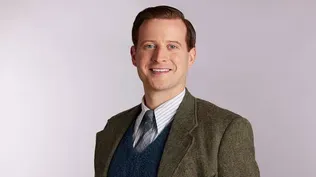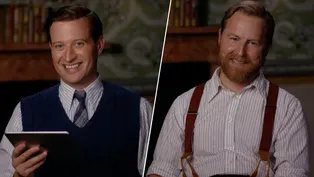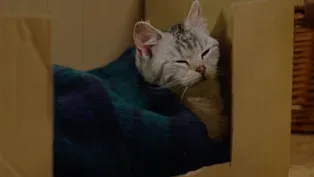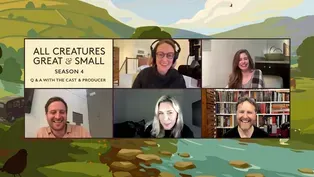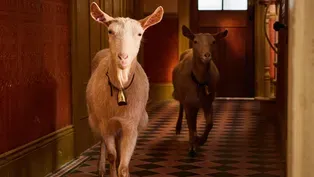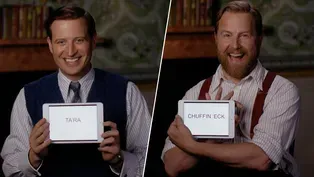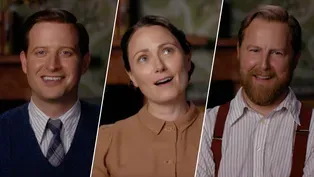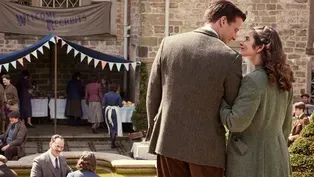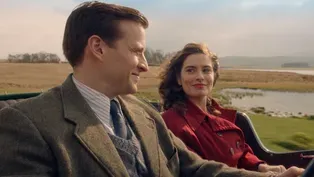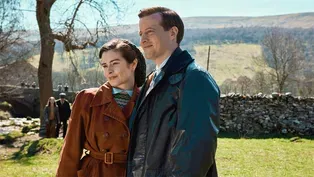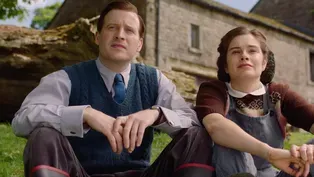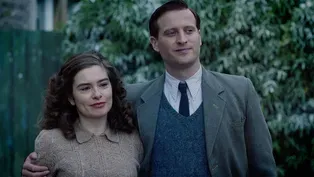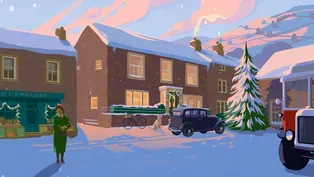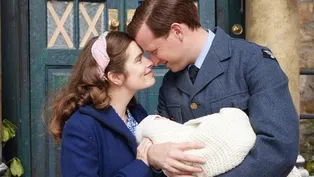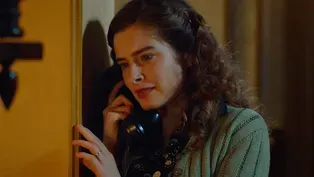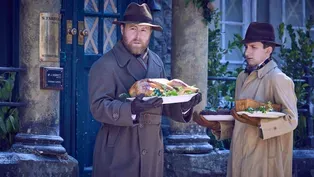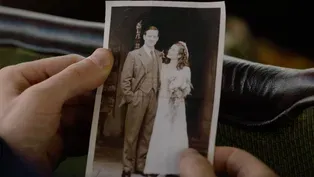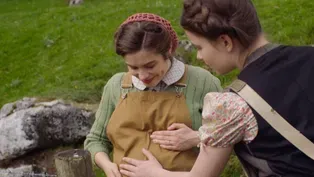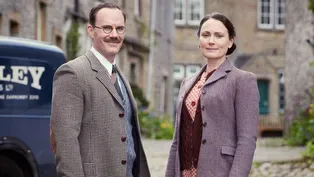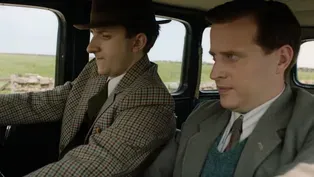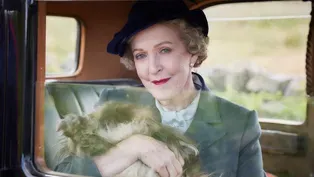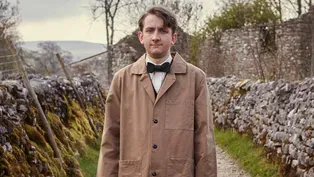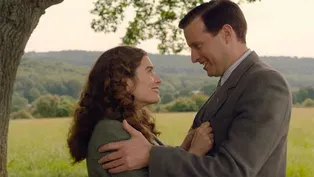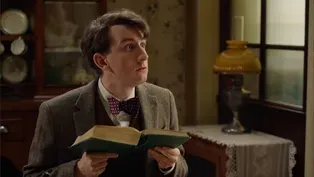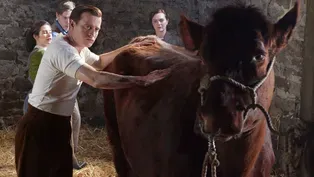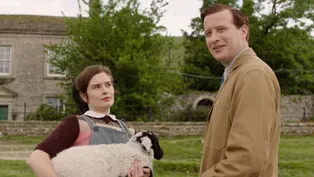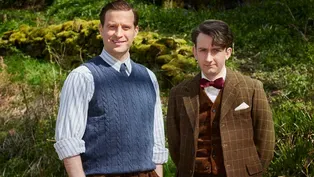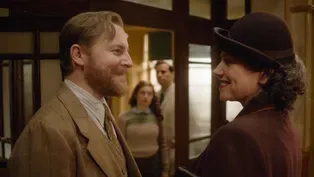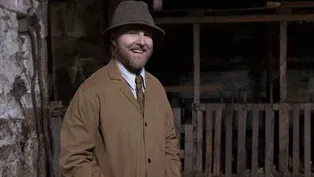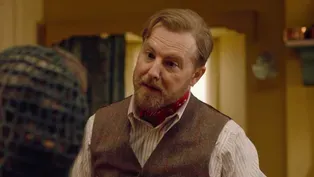
Season 4 Cast Q&A
Clip: Season 4 | 47m 29sVideo has Closed Captions
TV critic Kathryn VanArendonk hosted a Q&A panel with the cast of Season 4.
Kathryn VanArendonk, TV critic for Vulture and New York Magazine, hosted a Q&A panel with the cast of Season 4, including Nicholas Ralph, Rachel Shenton, and more.
Funding for MASTERPIECE is provided by Viking and Raymond James with additional support from public television viewers and contributors to The MASTERPIECE Trust, created to help ensure the series’ future.

Season 4 Cast Q&A
Clip: Season 4 | 47m 29sVideo has Closed Captions
Kathryn VanArendonk, TV critic for Vulture and New York Magazine, hosted a Q&A panel with the cast of Season 4, including Nicholas Ralph, Rachel Shenton, and more.
How to Watch All Creatures Great and Small
All Creatures Great and Small is available to stream on pbs.org and the free PBS App, available on iPhone, Apple TV, Android TV, Android smartphones, Amazon Fire TV, Amazon Fire Tablet, Roku, Samsung Smart TV, and Vizio.
Buy Now
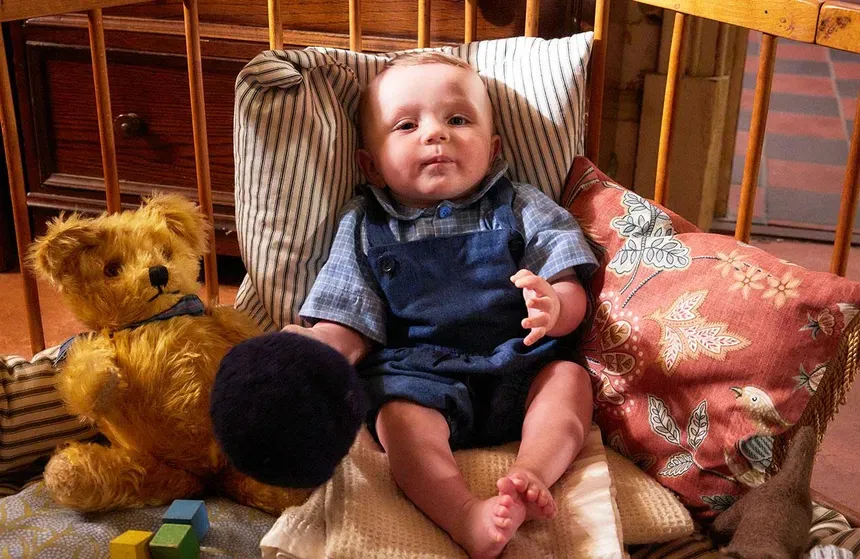
The Cast Gushes Over the Babies on Set
Get the adorable details of the cast's experience with the babies playing Jimmy!Providing Support for PBS.org
Learn Moreabout PBS online sponsorship- Hello, my name is Kathryn VanArendonk.
I am a TV critic for Vulture and New York Magazine, and I cannot tell you how delighted I am to be here to moderate this panel for the premiere, the US premiere of "All Creatures Great and Small" on PBS.
So, I wanna start by welcoming our fantastic panelists.
We have Melissa Gallant, who is an executive producer on the show, Nicholas Ralph, who plays James Herriot.
We have Rachel Shenton who plays Helen Herriot, and Samuel West who plays Siegfried Farnon.
We were really hoping to have Anna Madeley here today, but she's not feeling well, so we can all wish her the best and a and a fast recovery, but I am just so delighted to be here.
What a fun, and I think such a telling first episode or first half of an episode for the season.
It sets up so many of the themes that this whole season is really about, and I wanted to start by asking you, Melissa, it does feel like every season has a bit of its own flavor, its own character.
This is really the first season where we're, the war feels like it's significantly underway.
I wonder if you could just tell me a little bit about how you talked through what the character of this season was gonna be, how it feels the same as previous seasons, and what about it might feel a little different.
- Of course.
that's absolutely right.
Every season is a new chapter.
I think we think of it as almost the next book in the installment.
So, there are some things that are really familiar and the same.
I think particularly the wonderful tone of All Creatures that we all love.
It makes you laugh, it might make you cry, those sort of pivots between tone, between episodes, and within episodes and within scenes, but each series, really, is the next chapter in the lives of these wonderful characters.
Partly in terms of journeys that we've had planned out from the very beginning with Ben Vanstone and then Jamie Chrichton the wonderful lead writer of this series, and where we feel the characters are naturally taking us, but also we try to really lean into the truth of the time that the series is set in, and this series is set in 1940.
We start at Easter in the spring of 1940, which was a time when a lot of people were missing, a lot of people were away, particularly the men were at war, and in our world that's personified in the lack of Tristan, which I'm sure will come back to at some point in this conversation.
And so, I think there's a kind of rather lovely emotional undercurrent that runs under the series amidst the humor and vets falling in manure, and all the usual joys of Creatures.
There's this sort of emotional underbelly to it that's really interesting, and we wanted to lean into that place, and see how that time, and the truth of that time, affects our characters.
As I said, Tristan is away as per the books.
He's gone to serve in the Royal Army Veterinary Corps, but also James has hanging over him, and therefore said, does Helen and the entire household, the fact that he may be called up at any moment, he may have his papers served for the RAF.
So, what does that mean in this chapter of life for Helen and James as a couple, thinking perhaps they've been married for two years now, is that right?
For a year and about for a year about starting a family.
What do those big decisions look like in the framework of a changing world?
And we're always really conscious that, of course, the characters don't know what's gonna happen.
The spring of 1940 was a phase of the war which was known as the Boer War, the phony war when kind of nothing had happened.
The tape's being taken down off the windows, the evacuees have been sent home, and people genuinely didn't know whether it would come to nothing and the troops would be back home soon or not, and it's such an interesting space to lean into and to explore with these completely wonderful characters who give us so much endless story, and drama, and humor.
- Yeah, absolutely.
I think, you know, one of the other things that I was thinking about as I had a chance to watch this this season, which I enjoyed so much, you know, this is now the fourth season for all of these characters, and there are elements of it that come from the books very much still, but there's also all of this space that is being, you know, created for this show in particular, and I wanted to ask each of you what you feel like you know about these characters that you maybe did not know about them at the beginning of the start of this project, both in terms of, you know, the details, the small details of your lives that just sort of come up naturally as you're reading scripts, but also how these characters, what their emotional lives are like, who they are as as people.
I wanted to start with you, Nicholas.
I think it's been such a fascinating journey and this season really feels like James gets to, he really grows into, like real full adulthood and being the head of a household.
- Yeah, absolutely.
I think we've seen James grow personally and professionally over the years, and of course there are just things now that are much, the stakes are a lot higher, and the circumstances have changed.
You know, when James signed up, it wasn't the case.
He wasn't married, you know, and things like that.
And, of course, James and Helen are now.
You know, there's always gonna be that thought about family and things like that, especially around about this time.
We know that people, you know, started to have children and things earlier.
So, yeah.
So the stakes are higher, much more responsibilities, So he has to be, has to take all that in his stride.
One thing I've learned more and more about James as I've played him over the seasons, is how much I feel and think he deeply thinks, and deeply feels things.
You know, unlike some of the other characters who perhaps wear their emotions more on their sleeves, I think with James it's a lot more internal, and this is one of the wonderful things about Helen is she helps him eek.
She eeks, you know, that things to the surface and gets him to talk a little bit more and open up a lot more.
And, especially, they can do that now in their little pocket that they have in Skeldale House.
So that's one thing about the character that I particularly like, and it's wonderful to explore and as an actor it's amazing to dig into that and to dive into that, and these scripts are, you know, they're just wonderful scripts, so full of subtext that you can really do that.
So, it's a wonderful opportunity and yeah.
I'm loving.
- Rachel, what do you know about Helen now that you maybe did not know about her at the beginning?
- From the very first script that I read, Ben Vanstone's first script her directness and assertiveness just jumped off the page.
It was something that I knew right from the get go that she was tough, she was principled, but I didn't quite know how much, and we've really seen that over the seasons, walking away from a marriage that wasn't quite right or a potential marriage to Hugh that wasn't quite right, was a brave decision, and then her sort of courageousness to do the right thing and the thing that's right and not easy every time bowls me over, and it seems to get deeper and deeper every season, and this season's no exception we're in, as we've just talked about, uncharted territory to a certain degree, and the thing that she holds so dear, which is her unit and her partnership with James is under threat because he might get called up at any moment.
And as Nick and Melissa just said, there was a expectancy, a natural trajectory of a relationship around that time, it would be that a family wasn't too far away and that rocks her.
But as ever I'm just amazed at how she deals with situations sort of compassionately, but with so much courage and conviction as well.
She's definitely the, I think, the emotional leader in their partnership, like Nick just said, and manages to, you know, navigate through the difficult bits, and I love that about her very much.
- Yeah.
Sam, what do you know about Siegfried that you didn't know?
- I think the pleasure of playing somebody, anybody for four years is to get to know them more deeply, but one of the great pleasures of being in this show is that so many things that seemed there, but as it were under tracing paper, are gradually revealed, and you thought, no, I knew that.
I sort of knew that when I started and now I get to say it like the timeline of my marriage and Tristan, and that all makes sense now, and I think Tristan leaving has made me realize, I keep coming back to that line in Simon and Garfunkel, you know, "I am a rock and a rock feels no pain and an island never cries."
And I think what Siegfried's discovered is that he isn't as independent or as strong as he thinks he is, and he doesn't need to be because the idea that he needs other people, which he used to see as weakness, now feels like what the sort of cables that hold us together.
What Melissa talked about in terms of absence is a real constituent of this series I think.
It's invisible, but you know when you are filming things that are invisible that you're doing well because you can see them, and you can see the absences in this series, and we can feel them, and it's a very difficult thing to film, but I think, yeah, what I find in Siegfried is the holes in him that he's filled up imperfectly and they're sort of draining away and then they feel big and yawning sometimes.
And I like that.
He's such a layered, complex person.
- Yeah, that's so fascinating.
It is also the kind of thing that Siegfried is so good at and has these opportunities to play that exact idea with humor, but also with sadness.
Like, you have this moment that we saw in that first episode where he's looking over these letters from Tris, but on the other hand you have the absence of smoking, which he then is like frustrated and pretending is fine about.
- Well, playing the coverup is always fun as an actor, isn't it?
You know, I'm, (indistinct) but I'm damned if I'm going to show it.
I'm a spy, but I'm damned if I'm.
I miss my brother, but I'm damned if anybody's gonna know.
So I cover it up with humor, and tobacco, and then those things, you know, disappear eventually.
You see the yawning chasm underneath.
- Yeah (laughs).
I wanted to ask just more specifically about the absence of Tristan, because it is so palpable here, and I found it to be so effective.
I, as a viewer, missed him so much, which is, of course, exactly the thing that you are, that you wanna create in this sensation, this lack of this character.
Melissa, I wonder if you could talk a little bit about how you all conceived of the season sort of without him and what it also feels like to be playing around this kind of missing this gap in the show.
- It was a juicy challenge from a program maker's point of view, and I think we are all, it's been like a family behind the series.
I think we also all had our own kind of grief at the, the notion of a series, we're following the books where Tristan goes away to serve in the Royal Army Veterinary Corps.
without Tristan, without Callum Woodhouse, who is a wonderful force of nature.
But the first steps were really with Jamie Crichton and our writers team.
We got in a room with a load of whiteboards and wrote down everything that Tristan brings to the series, to the relationships, what he is, how he functions for every character.
You know, he is sort of Mrs. Hall's surrogate son.
He is the child Siegfried never had, and the annoying brother he did have, and he's sort of a lovely buffer for James when Siegfried needs to blow off steam.
You know, he's kind of the character in the house because they're related that Siegfried take it out on.
It's just interesting if you remove that.
James at one point in the series sort of says, I feel a bit like Tristan.
So, we looked at that and as you can imagine, there were whiteboards, and whiteboards and whiteboards.
He brings so much to the show, particularly humor, but also he's a bit of a tragic clown.
He's a bringer of mischief, so many things.
So, we looked at that and looked at how we would compensate for that and how we'd tackle it, and I think we very quickly realized that our challenge and the challenge for an audience saying, oh, we're really gonna miss him, is the same challenge that our characters have.
That's the story of the family.
I think particularly Siegfried, there's quite grief in this series as we discussed, and there would be a temptation to fill that gap quickly, to bring in a new character in episode one, but we were really drawn to an interesting in the space and in the gap and what that meant.
I mean, in families it's very true, isn't it?
If a member of a family goes off to college, for example, say the funny one goes off to college, well then other people get to be the funny one, and we were really interested in that house and the characters and how we could sort of stoke those relationships and shift the dynamics and see a family growing and adapting around a space and what that meant.
That just felt truthful and kind of enormous fun.
And so, we do bring in a new veterinary trainee, not yet, you'll have to wait for that because we wanted to explore how does Siegfried fill that space in really funny ways.
Particularly in episode two, we bring a character in who is an iconic Herriot character that we've actually thought about bringing every series and this was the right moment, and seeing, we come in sort of three months after he's missing, that's three months without a vet with a vet down.
It's three months of Siegfried discombobulated trying to manage that.
Three months of James kind of not having Tristan to take the fall on things.
It's three months of Helen having to kind of step up and fill in and fill those gaps.
So, it was just a brilliantly fascinating opportunity.
And, then we bring in, once we've played with that, we then bring in a character who we wanted to occupy a really different space.
It was felt like the wrong choice to bring in a character who was just Tristan, another Tristan.
Callum's shoes are huge to fill.
That sort of wasn't that interesting, so we wanted to create a character that occupied a really, really different space in the house.
And the other key thing about Skeldale House and sort of the magic of it is it always meets the needs of the characters in it.
And so, we created a character who's based on character in the books, who's only briefly, there's only two chapters that feature Richard Carmody's the new character that comes in.
And as ever, the writing team with Jamie leading sort of took that character and created a backstory and saw how, as a journey through this series, the way in which the house could meet the specific needs of that character.
So, it's been sort of wonderfully challenging and interesting, and I think gives us quite a different season.
- Hmm, absolutely.
I wanted to ask Nick, I wanted to ask about Carmody actually, because it's such a fascinating opportunity anytime you have some new energy in the house.
I'm curious just from an acting perspective, what it is like when you have suddenly new energy that you're all getting to play with.
Was that experience, were you all pranking him all the time, or were you all being extremely professional and then pretend you used to gradually getting to relax again?
How did it go?
- Yeah, no, we were extremely professional.
Welcomed him in with open arms and didn't prank him or anything at all.
No, we, that was great fun.
And you know, hats off to the young actor that came in to play Carmody because, you know, coming in a fourth season in the show where it is like a little family up there.
So, you know, he came in it felt like he'd been there the whole time.
So, we get to see a lot of fun.
I think for James's perspective.
I mean, he's looking to, you know, they're looking for a bit of help around the house and things like that, and he kinda thinks he'll be a mini me and it's a brilliant idea, and it doesn't quite go to plan as we'll see.
I don't wanna say too much, but yeah.
No, it was wonderful, and yeah, just like Melissa said, a completely new dynamic, completely new energy to bounce off of, and we got to see, because of that, we get to see James in some different situations as well now, you know, as the senior vet to a young.
Almost kinda taking on a Siegfried kind of role for the younger intern, which has yes, some funny consequences as well.
So yeah, it was a, a real welcome to the pack.
- Sure.
it occurred to me that you also then get a new actor who has to learn how to drive all of the ancient cars.
How did that go?
- Funny you should say that.
- Funny you should say that, but a little on screen and off screen.
So yeah, this you'll discover, but actually initially neither the actor nor the character can drive, which was funny and useful.
- Oh no!
(laughs) Well, then you get another sort of offscreen onscreen perfect mirror situation.
- He was really good at that bit.
- And also it's interesting because it's entirely essential to be able to drive as a veterinary surgeon in the Dales at that point, so yes.
- They were one of the very few people who had petrol when it wasn't, when it wasn't for them.
- So, in terms of him being new James Anthony-Rose, who plays Carmody, he's fabulous, and I showed him around the studio set of the house when he arrived, and he spent a little bit of time in there, but he said, I don't want get too familiar with it because I want to walk in and it feel new and me feel like the outsider.
So, he spent a little bit of time, but wanted to have that experience of it not yet being his home.
- Yeah, that's, I mean, it does feel like there are so many just lovely coincidences of the realities of how this season had to get made and then what actually you were playing on screen, which is lovely.
Rachel, I was wondering, you know, it's obviously an important turning point in Helen's life for Helen and James.
There are all of these opportunities to play different colors of her thinking about what her future is gonna be.
I also noticed that because of some of these newcomers in the house, you have this opportunity to actually feel slightly more friction between Helen and some of the other, sort of, people who are living in Skeldale.
I'm just curious how you approached those challenges, and because it is a family whenever there are these fights they can get, how do you think about tone?
How angry is anyone allowed to be?
How funny are those fights allowed to get before they really need to kind of be brought back into the family space?
- Oh, that's a really interesting question.
I guess Helen's in a unique position in house, always has been.
She's obviously the only person that isn't employed by Siegfried, so.
- Right.
- She sort of royally unfazed by Siegfried really, and always has been.
So, I think if there was anybody that would stand up and give him a bit of a run for his money, it would be Helen.
And there's, yeah, there's a theme this season that that's definitely alive and well.
But I think she's just got a unique ability really of, I think she's really emotionally intelligent and she's kind of one step ahead of everything that's going on.
She's good at reading a room, so she spots things early and is usually part of the deescalation and the calming down of the, you know, putting the fires out and things, and that's her role throughout this season too.
And then she'd include herself in that so she can know, she knows when she needs to speak up and that she also knows when it's time to step back, and that's one of my favorite things about her.
And this is, yeah, probably the first season we've seen that in many different ways.
I'm trying to censor and not say too much storylines.
Hope I answered.
- I think the other thing that I haven't said that's a real sort of personal favorite element of this series is the relationship between Helen and Mrs. Hall, the brilliant Anna Madeley who can't be with us tonight, but obviously two such wonderful actors.
But it's really interesting to see their relationship grow.
Obviously Helen only moved into the house in season three, but to see that relationship develop, and see women supporting each other, which was of course was hugely important when lots of people have gone and lots of men are away.
So, that's a really beautiful and fun relationship that develops across the series.
- Yeah, the, the thing that I think is so, I am so drawn to, in the makeup of all the relationships in Skeldale, is the way that there are all of these overlapping, professional, romantic, fraternal, platonic, all of these relationships that sort of everyone has.
Not just one, but often several with each other, and how you sort of choose what moments, what scenes are like.
We are employers right now.
We are having a professional relationship.
We are friends right now and the places where they, where you get to kind of find little corners of them.
I'm curious.
Sam, I was curious, Siegfried is so, because he sets the tone for so much of the house, how you think through what moments that he is going to be the sort of professional Siegfried self, and what are the places, what are the times of the day, the places in the house, the kinds of scenes where he becomes sort of more of the friend or the brother?
- That's a really good question.
I think a after hours.
I mean, he's very professional and they start early.
you know, the list is first thing and they work late.
They work at Christmas and you know, they work on Sundays.
What I love about it is that I don't always know the answer to that question, and because now without Tristan, none of us are actually related in this weird family.
And so, on some level the gloves are off, but then other gloves are on.
And I think Siegfried so much is to the beat of his own drum that, you know, I mean this is what I've learned from people who knew that the real Donald Sinclair, that he was completely mercurial, changeable, and very absent-minded, but he didn't bear grudges.
So, he would get terribly cross with somebody for forgetting something and then have totally forgotten it.
But when they haven't, he had.
and then totally forget about it the next day.
So, you know, do I contradict myself?
Very well then I contradict myself, as the poet said.
And I like the fact that what Siegfried says may not have very much relevance to what he said 10 seconds earlier, or what he's about to say in 10 seconds time.
- Yeah.
- 'Cause we all think and talk quite quickly in this cast, And I think that's a great, well it's a skill obviously as an actor, but it serves the scripts well.
- Yes, for sure.
I'm just curious, thinking back over the whole, you know, fourth season, what you would say was the hardest scene to shoot.
Whether sort of emotionally, in which case you're gonna have to probably talk around it because of spoilers, or because of logistical reasons, animal reasons.
What were the moments where you felt like this is a particularly challenging part of this job?
- We were doing some driving out in the Dales, and as mentioned, Jamie, who comes in to play Carmody, doesn't drive.
So, that was a lot of fun and a bit of a struggle at the same time, and there's, you know, a bit of dancing to do with people coming in to double and things like that.
But we had an old tractor come out that was gonna overtake us because his driving's so terrible.
And the tractor pulled out of the field, this tractor from the '30s or '40s and the tire blew up on it.
So, here before the first rehearsal.
So that went down.
So, then they took a low loader, and there was a low loader there as well, so I think they got the tractor back up and running, and then we set up on the load loader and then the tire blew up on that.
So, it was a day tires blowing up for whatever reason.
So that was, yeah, that was particularly challenging.
- Hmm.
Rachel, do you have, does anything come to mind?
- It does, but I'm gonna have to really censor myself.
There's a beautiful scene in towards the end of the series - Sure.
- That in rehearsal I couldn't get through.
- Mm.
- I was, I was very thankful that our brilliant director let me do it in one because I don't think I, I don't think it would've been any good if it was shot any other way, thankfully.
It was a testament to the writing and the story really, so can't say anymore, but that would be the one for me.
- Sure.
Sam?
- Well, without giving any spoilers away, I probably ought to talk about a scene that you've just watched, or one of the scenes you've just watched with Paul Hilton and (indistinct).
That was shot very early in the last season's filming in mid-March on a very high bit of the Dales.
All the snow arrived in about 10 minutes and then was gone 10 minutes later.
- Oh no.
- I posted a picture on my Twitter feed that looks incredibly like a famous English portrait painter, which you should have a look at it.
It was an absolutely astounding scene, but very difficult continuity wise because the snow kept coming and going, and our easy ups blew away.
They're the things you change in.
And so I had to, I had to go into a 1930s shirt, bare chested, standing up against the side of a 15th century cow barn in a biting full wind and full snow.
And nobody's fault, but the Dale, - It's not as glamorous as people think, is it?
- The Dales don't, don't tell you, you know, like that.
- They're not very forgiving, are they?
The Dales?
- Not particularly at all.
- Melissa, I was actually gonna ask sort of the same thing.
I'm curious, from a writing perspective, just from a planning perspective, what would you say was sort of one of the more challenging elements of trying to think through what this season was going to be?
Either from a, like how do we get these characters into a specific place, or how do we create a tone that I'm looking for?
- Such a good question.
All of that, I think dealing with absence, as we've discussed.
I think tone is always one of the hardest things with this show.
I think things that feel easiest on screen are often extremely difficult to do well, and it's a real tribute to Jamie Crichton and Ben Vanstone and our wonderful writing team that they managed to find that tonal sweet spot.
So, I think, you know, absence and war, being balanced carefully with humor, humanity, joy, love, kindness, moments of ridiculousness so that the audience have sort of the same experience and feeling it, watching the show that we all love and I think you will come back for.
So, just guessing that right.
That allowing those moments of pathos, and those really difficult moments and being truthful, that's probably the thing, being really truthful, and not giving our characters an easy run of it.
And yet it's still being entertaining and uplifting.
That's sort of the tonal dance that I think we have to get right in the scripts and these wonderful actors deliver so perfectly on screen.
I think sort of one of the hardest things, one of my favorite things is this, I think this season more than any season to date, it's sort of a celebration of the found family because none of them related this year, but I think overall this season is about whatever life brings, however difficult things are, whatever challenges are thrown at us, if we've got people around us that care about us, whether we're related to them or not, if we can connect with people, and be with people and they can walk alongside us, then we can find a way through and we'll be okay.
And I think that is just a really comforting and uplifting world to be in, and I think that is the balance to the challenges that our characters go through.
- Yeah.
I have an audience question.
Carla from Tennessee wants to know, for the actors, do the characters that you play have any effect on your personality outside of shooting?
Have you taken on any of their traits?
- I think my partner would say that Siegfried is a nice person to bring home with you.
I mean, he can be.
You know, I've played quite a lot of Victorian murderers on the whole.
- This one's better?
- Yeah, was not so much fun to live with murderers.
But yeah, I think what Melissa just said has really been a fact of the last four years actually.
I've really felt enormously happy in this job because of the connections, because of the people, because of the pleasure of playing a part that you like, and people like you doing for more than 10 minutes, you know?
And I think that's probably made me, certainly made me happier.
It's probably made me better to live with as well, - Rachel?
- I think the character might be informed by me rather than I'm informed by the character possibly.
I think there's, yeah.
Well, I've only got me, so I guess it's definitely packed with parts of me, and you pick out the bits and you sort of create this person really.
She's certainly influenced my wardrobe.
I've got more dungarees than I've ever had, so that's something (laughs).
- And I think Nick Ralph might have some corduroy now in his wardrobe, in my recent exchanges.
- Is that the case?
- You are correct.
I don't have them on, but they are there in my wardrobe, yeah.
I mean, well, yeah, I mean, Helen definitely, I think hands down we can all all agree Helen has the best wardrobe.
However, these sweater vests, you know, I'm beginning to really enjoy them.
With James, I think actually following on from what Sam said, I think it's more, it's such a joy to be up there doing it and filming it, and we have such a good time working on it together.
I certainly go home, you know, feeling happy and doing the show, yeah, it rubs off on you.
Like character, show, you know, production, so I definitely go home feeling feeling quite good.
And after a hard week, and we've maybe been up in the Dales and it's been snowing and it's been wind and rain and wind, and, you know, you can have a beer on, you know, on a Friday evening and it's just such, it's so much fun to even have dinner and just to talk about the week that's just been.
And then culminating in when we actually get to see the show, because I read these wonderful scripts and obviously not part, there's all the scenes with the other actors that you haven't seen.
So then you get to watch the episode and see it play out with these guys.
So, and that's a real pleasure as well.
- Yeah.
Hannah and Kate from New York ask about your most memorable animal experiences from this series.
Obviously we have to talk about the animals.
I was going to ask also, in particular, who is more challenging to work with?
A ferret or a rat?
- I haven't worked with a ferret, but rats are a beauty to work with.
They're much, much easier than humans.
They behave well and are a joy to handle, which is more than I can say for most actors.
- Okay.
A rat or a cat?
- Present company except excepted.
Nick, you were, you were dealing with the ferret mentioned.
- Ferret was pretty lively, actually.
- Yeah, he was.
- I'd say there rat.
- Yeah, Sammy, I mean you handle (indistinct) so well, but the little ferret he was a cute little guy, but yeah, he was nippy, so he'd get away with you.
And also also they have a particular smell.
- Yeah.
- Hmm.
- The trouble with the cat, when he appears, is that he's, as my partner said, he's the cat with the come hither and bring your, what did she say?
She said, come Heather and bring your camera eyes.
(host laughs) He's impossible.
He steals your closeup and he's so beautiful that nobody looks at anything else.
- The other thing we haven't said is that this year we have our goat debut, which is probably not something that's uttered on most Q&As, but the goats are rather glorious.
- The goats terrific.
And there's a tortoise as well.
- Yes, I was gonna ask about the turtle, or tortoise.
- Tortoise, yeah.
- Yeah.
- Is he tortoise?
- Does the tortoise give you a lot to play off of, or is it more of a?
- Well, to be honest, he was one of the fastest tortoises I've ever seen.
I mean, he wouldn't stay still for his closeup.
You'd put him down and think, well at least he'll be there when you turn around.
And he wasn't.
He was on the other end of.
- He also had a twin.
We had to have two tortoises.
George the tortoise played the tortoise, but because they have to be kept warm on a heat mat, we had two, so that one wasn't off it's heating mat for too long.
Have wonderful people behind the scenes in our animal team, vets and handlers, that work out all these wonderful things for us.
- And the tortoise may be the oldest member of the cast as well.
I think that one might be about 70.
- You're right.
- Wow.
Wow, well then the tortoise gets to do whatever it wants, I feel.
- Exactly.
- Julia from Washington, DC asks, who are the pranksters on cast, and who is most likely to crack during a take when it is funny?
- I think she's ill, the one that, that that will crack during a take.
- Definitely Madeley.
- Definitely, yeah.
- And when she goes, you can't help but join in because she like, she like crumbles.
It's like completely taken over by it.
She loses all control.
It's brilliant when it happens.
- Oh, that's so lovely.
- Nearly had to send us home once.
We nearly had to wrap early.
- Her eyes are streaming, she can't speak.
It's great.
- I'm so sorry.
My speaker has turned on behind me.
Classic.
Okay, so Nancy H asks, what do you like most about filming around the Yorkshires, and what's your relationship with the, sort of, local people?
Do they look forward to you coming?
Are there places that they get really excited about when filming comes back?
- One of my favorite places is a little village called Arncliffe, which is the back of Skeldale House, and we also did the film there in season one, and it's where my parents normally arrive on the bus and I drop them off at the bus when they leave that area.
I mean, there must be 20 houses or something, you know, it's this little place and so we need to dress up so little because it's like time has stopped about the 1930s.
It's just great.
But there's a group of ladies that go out for a gin and tonic about four o'clock, and they always say, "Nick, Nick are you coming over for a gin and tonic?"
I was like, oh, I just got a few hours left to do, I'm still working.
- Oh, you should join them one time.
They'd be thrilled.
- I know, and maybe later.
So I haven't, yeah, I haven't managed to get that gin and tonic, but at one point I will.
But they're lovely.
They come out and we have a little chin wag with them between scenes and things.
Yeah.
It's very sweet.
- Mm, yeah.
I wanted to ask, you brought up the sweater vests, and also the realities of having to change into a 19th or a sort of early 20th century shirt.
I'm always curious about costuming because it feels like such a, such an important part of a character, and it can be so useful as a way to think about who this person is and how they engage in the world, and sort of how physically they live in the world.
I'm just curious if there are objects of costuming, a sweater vest or galoshes or whatever it might be that you feel like are really the thing about this person that when you put them on you're like, ah, yes, now I understand who this person is.
- Yeah, it Helen's dungarees probably.
I feel most like her, I guess, when she's in dungarees.
She's very practical.
We all know that she was the first woman in her village to wear trousers, and so the idea that you would wear anything but when it's minus degree temperature and you're in the Yorkshire Dales of course you'd wear trousers.
So, I like that about her.
And Ros Little, our costume designer put a lot of thought when creating Helen into everything, being, having a practical element to it but she still manages to look great in the outfits, so I love them, but there's always a practical element.
They're always warm, and they're layered, and they're good to climb over a fence if you need to.
So yeah.
But back to the question is dungarees for me.
- Dungarees yeah.
Siegfried, or not Sam, Siegfried's tweeds or?
- I have a dark green suit that I wore to audition for the part of the course vet at the race course in series one, and that's the suit that I want to wear when I want to be professional or smart, and the rest of the time it's all practicality.
There's some nice gators that go over your calves to stop you getting too muddy, and that they remind me too much of the First World War.
So, they come with bad memories.
So yeah, that and the bowler hat, which I don't wear very often, it's a sort of.
I love the fact that Siegfried in his own world is the professional that people look up to, but actually when you get out into the wider world, there are plenty of people he still has to impress to get all the work he needs.
So, that's what I do when I need look a bit smarter.
- Nick?
- I've got a pair of brown brogues that I've had since the start of the job and they're still going strong, so they're very much lived in, and yeah, I've had them since day one.
So, whenever I've got them on, I always feel, yeah, very settled.
And also it would be not so much costume, but hair and makeup.
It's the hair.
When you get the slick back do and the hardened gel blarted on, it's almost like a LEGO head.
You can pop it off and leave it for the next day.
Yeah, once I've got the hair and the shoes the brown brogues.
- Yes.
I'm growing my beard at the moment.
I have to start in November, and the more I, the more of my face I cover up, the more I feel like Siegfried, it's a blessing.
- Hmm, interesting.
- And costume in general as well.
When you have it on, when you have the sweater vest, the shirt, the tie, the blazer, the dungarees and the corduroy, sorry, you hold yourself in a different way, postaurally, you hold yourself in.
So, the costume it does that for you as well.
- Yeah, when your silhouette changes your character changes.
- Yeah.
- Yeah.
- I have a question from Bob who is a veterinarian himself and is very, very impressed with the realism of the show, so congrats to all of you, but he is curious if you struggle with the jargon and sort of how you talk through the language, which I imagine would sometimes offer some challenges.
- Does he mean the veterinary language?
The medical language?
- Yeah, I think so.
- Well, yeah, it's very hard.
Sorry, Nick, go on.
- No, cut it.
No.
- Well just, it's very hard to know what's, first of all, medically correct, and what period, because it's such, it's changing so quickly.
- Sure.
- In the 1940s.
- You know, we can see early painkiller.
We've got early painkillers, but we don't have antibiotics yet, so the stuff that we know about and are able to talk about, I mean modern vets will say, oh no, that hasn't come in yet.
We always go to Andy Barrett, to our onset vet, and I write to him and say, "Is this euthanize?"
Would we have set to sleep?
You know, what can we say?
Would I have abbreviated this chemical here because we know exactly what we're talking about.
Is it over explaining?
Or do we need to make it clearer for people who haven't heard it?
And he's always very, very quick getting back to me and saying, yeah, I think you'll get away with that.
- Yeah, it's fascinating.
- Yeah, but it is true that it's tricky because there was even some, there was one word and we went to Andy Barrett and said, how do you say this?
And he was like, "Oh, that's so old I don't even know how to pronounce that."
We just had to agree upon how we were going to say it.
But I've also done the audio books and one of the very first chapters in "All Creatures Great and Small" is Siegfried taking James round, and he goes into the dispensary and into the war room with all the old equipment, it's just one after another vet jargon.
Honestly, that one chapter, it took me about a week to prepare it, just like trying to figure out how to say all these words.
So yeah, it was a real, it was very tricky.
- The other person that we should give credit to, Bob I'm really pleased we've got it right, is Jim Wight, who is the son of Alf Wight, the real James Herriot.
So, he's involved at script stage and we send him the scripts and he says, well, you wouldn't call it that.
Well this is the right medication, so he helps us get it right, and then Andy Barrett, as Sam and Nick have mentioned, our on set veterinary advisor who worked with James Herriot himself, will help these wonderful actors stand in the right place and know how to hold equipment and pronounce things properly.
- Yeah.
This has been just such an absolute pleasure.
I'm so thrilled to have been able to talk with all of you.
I do have one more question that actually when I just discovered that I was gonna be doing this panel, people came and found me on Twitter to say, please ask specific questions.
Which is just, I think, testament to how loved this this program is, and one of the questions I thought was so fun was for the cast, if you could play one of the other characters, one of the other human characters on this show, what role would you play?
- I might have a go at Mrs. Pumphrey.
- Mm Yep.
- One of the human characters.
- A real transformation.
It would be a stretch.
- Sure.
- And I also think it would be a lot of fun.
- Right.
And the costumes, right?
I mean the hats and the.
It would be.
- Yeah, she's got a bit of wardrobe than James.
Yeah, Mrs. Pumphrey.
- Nice car too.
- Oh yeah, for sure.
- And you get to hang out with Tricki Woo all day, you know, little Derek.
- Rachel, what would you do?
- I might have a go at Siegfried.
(host laughs) - I was thinking I'd rather like to have a go at you.
maybe we could swap for an episode.
I've always fancied myself in dungarees, so.
- Yeah.
- I rather a suit.
- You'd look amazing in a bowler hat, actually.
- Well, there's a plan for the next readthrough.
- Please.
And then please also take a lot of social media footage so that we can all enjoy.
I think it's gonna be fantastic.
This has been such an absolute pleasure.
I wanna thank all of all of the panelists.
I also want to remind everyone who is watching, I assume if you are here, you know that the premier is tonight at on PBS at nine o'clock.
You should also consider tuning in early at eight o'clock.
It's the premier of "Miss Scarlet and The Duke" which is a very fun show if you haven't had a chance to check it out.
And I just wanna say again what an absolute pleasure this has been, and I hope everyone has a fantastic rest of their weekend.
- Can we raise a glass to Callum Woodhouse, 'cause it's his 30th birthday.
- (gasps) Wow.
- Happy birthday, Cal.
- Cheers - Happy Birthday.
- Cheers for that.
- Well, thank you, Kathryn.
Thank you to this wonderful audience.
You know, thank you so much for your interest and loyalty and enjoyment in the show, which has meant that we've been able to keep on telling these stories.
- Yeah.
- Thank you.
- Thank you.
Video has Closed Captions
We put Nicholas Ralph's and Samuel West's veterinary knowledge to the test! (2m 44s)
Video has Closed Captions
Meet Humbug, the new, cuddly kitten star playing Oscar in Season 4. (1m 25s)
Video has Closed Captions
TV critic Kathryn VanArendonk hosted a Q&A panel with the cast of Season 4. (47m 29s)
Video has Closed Captions
The fun never stops! The cast discuss the lively new animals in Season 4. (2m 26s)
Video has Closed Captions
How well does the cast know Yorkshire slang? We put them to the test! (2m 46s)
Video has Closed Captions
Biscuits or cakes? Tea or coffee? The cast were put to the test in a lightning round! (1m 41s)
Video has Closed Captions
New characters, new animals, and more touching moments are coming in Season 4! (2m)
Video has Closed Captions
Need a refresher on Seasons 1-3? We've got you covered! (3m)
Video has Closed Captions
Change is on the horizon for everyone in Skeldale House in the spring of 1940. (1m)
Video has Closed Captions
The people of Yorkshire come together and adapt to the uncertainties of war. (1m 30s)
Video has Closed Captions
Refresh your memory of everything that happened in Season 3 and where we left off. (2m)
Happy Holidays from MASTERPIECE
Video has Closed Captions
Happy holidays, one and all, from the MASTERPIECE family to you! (38s)
James, Helen and Baby Makes Three
Video has Closed Captions
Relive all the the touching, sweet moments on Jammes and Helen's journey to parenthood. (2m 55s)
Video has Closed Captions
James calls Helen to let her know how training is going and to discuss upcoming plans. (1m 8s)
Video has Closed Captions
James tries to get home for Christmas and Skeldale House prepares for a new arrival. (30s)
Video has Closed Captions
James recites the classic poem "A Red, Red Rose" by Robert Burns. (1m 5s)
Video has Closed Captions
Helen admits her fears about motherhood and childbirth to Jenny. (1m 7s)
Video has Closed Captions
When Richard Alderson needs some help, Helen returns to Heston Grange. (30s)
Video has Closed Captions
James is attempting to teach Carmody how to drive, but it's not going so smoothly. (1m 14s)
Video has Closed Captions
With the war feeling closer to home, James wants things in order and Carmody trained. (30s)
Video has Closed Captions
Skeldale House has a new vet! Meet Richard Carmody, the studious new hand on deck. (2m 37s)
James and Helen in the Family Way
Video has Closed Captions
James plus Helen plus baby make 3! The Skeldale family is officially growing. (2m 12s)
Video has Closed Captions
Carmody is studying up before surgery, but Siegfried has another plan in mind. (1m 9s)
Video has Closed Captions
Carmody is challenged with learning how to be a vet outside of his books (30s)
Video has Closed Captions
James shares his excitement about the new vet they've hired for the practice. (50s)
Video has Closed Captions
Busy and exhausted, James and Helen can’t get any time together. (29s)
Video has Closed Captions
Mrs. Harbottle, a potential new bookkeeper for the practice, pays Siegfried a visit. (43s)
Video has Closed Captions
Siegfried has the bright idea of bringing in an experienced bookkeeper, Miss Harbottle. (30s)
Video has Closed Captions
With Tristan off at war, things are busier and more chaotic than usual at Skeldale House. (1m 45s)
Providing Support for PBS.org
Learn Moreabout PBS online sponsorshipFunding for MASTERPIECE is provided by Viking and Raymond James with additional support from public television viewers and contributors to The MASTERPIECE Trust, created to help ensure the series’ future.



